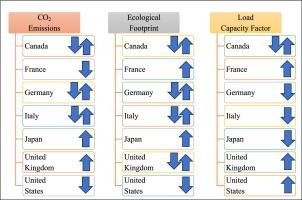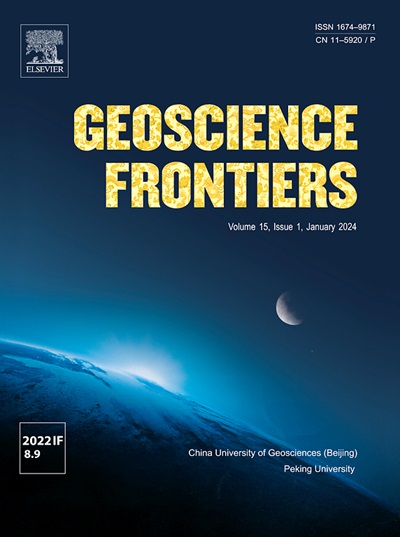通过严格的环境政策实现环境质量:七国集团国家多种环境指标的比较证据
IF 8.5
1区 地球科学
Q1 GEOSCIENCES, MULTIDISCIPLINARY
引用次数: 0
摘要
随着公众对气候变化的日益关注,各国纷纷采取措施应对气候变化,支持环境的可持续发展。考虑到这一事实,本研究调查了以环境政策严格性指数(EPS)为代表的环境措施是否能有效地实现作为主要经济体的 G7 国家的环境可持续性;研究使用了多个环境可持续性指标,并采用了 1991/Q1 至 2020/Q4 的量化方法。结果表明:(i) EPS 在法国和美国的所有量级都能抑制二氧化碳排放。此外,在德国和意大利,在较低的量值以及加拿大在较低和较高的量值下,EPS 的效果都在下降;(ii) 在美国,EPS 在所有量值下都会减少生态足迹,而在加拿大和德国,在较低的量值以及意大利和英国在较高的量值下,EPS 都会减少生态足迹;(iii) 在法国、英国和美国,EPS 在所有量纲下都会刺激负载能力系数,而在加拿大,EPS 在较高量纲下会刺激负载能力系数;(iv) EPS 对环境的因果效应在不同量纲下各不相同;(v) 量纲回归法验证了结果的稳健性。总体而言,研究结果表明,EPS 对环境可持续性的影响在不同环境指标、不同国家和不同数量级之间存在差异。在确保环境质量方面,美国的 EPS 完全有效,日本的 EPS 完全无效,其余七国集团国家的 EPS 效果参差不齐。本文章由计算机程序翻译,如有差异,请以英文原文为准。

Achieving environmental quality through stringent environmental policies: Comparative evidence from G7 countries by multiple environmental indicators
Compatible with the increasing public interest on climate change, countries have taken measures to combat climate change and support environmental sustainability. Considering this fact, this study investigates whether environmental measures, proxied by the environmental policy stringency (EPS) index, are efficient in achieving sustainability of environment in G7 countries as the leading economies; uses multiple environmental sustainability indicators, and applies quantile methods from 1991/Q1 to through 2020/Q4. The results show that (i) EPS curbs carbon dioxide emissions in France and the United States across all quantiles. Also, it has a declining effect in Germany and Italy at lower quantiles and in Canada at lower and higher quantiles; (ii) EPS declines ecological footprint in United States across all quantiles, while it curbs in Canada and Germany at lower quantiles as well as in Italy and United Kingdom at higher quantiles; (iii) EPS stimulates load capacity factor in France, United Kingdom, and United States across all quantiles and in Canada at higher quantiles; (iv) causal effect of EPS on the environment varies throughout quantiles; (v) the robustness of the results by quantile regression method is verified. Overall, the results reveal that the effect of EPS on environmental sustainability differentiates across environmental indicators, countries, and quantiles. In ensuring environmental quality, EPS is completely helpful in the United States, fully inefficient in Japan, and has a mixed effect in remaining G7 countries.
求助全文
通过发布文献求助,成功后即可免费获取论文全文。
去求助
来源期刊

Geoscience frontiers
Earth and Planetary Sciences-General Earth and Planetary Sciences
CiteScore
17.80
自引率
3.40%
发文量
147
审稿时长
35 days
期刊介绍:
Geoscience Frontiers (GSF) is the Journal of China University of Geosciences (Beijing) and Peking University. It publishes peer-reviewed research articles and reviews in interdisciplinary fields of Earth and Planetary Sciences. GSF covers various research areas including petrology and geochemistry, lithospheric architecture and mantle dynamics, global tectonics, economic geology and fuel exploration, geophysics, stratigraphy and paleontology, environmental and engineering geology, astrogeology, and the nexus of resources-energy-emissions-climate under Sustainable Development Goals. The journal aims to bridge innovative, provocative, and challenging concepts and models in these fields, providing insights on correlations and evolution.
 求助内容:
求助内容: 应助结果提醒方式:
应助结果提醒方式:


